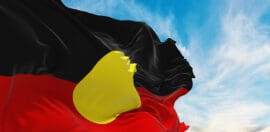Community housing group pave way for reconciliation

27 May 2019 at 4:42 pm
A leading community housing group has launched a Reconciliation Action Plan in a bid to strengthen relationships and cultural understanding between Aboriginal and Torres Strait Islander people and communities the organisation works with.
Community Housing Limited (CHL) launched the plan on Monday to mark the first day of National Reconciliation Week, which aims to reflect on and improve the relationship between Australians, while celebrating a shared history.
With over 14 per cent of CHL’s housing tenanted by Aboriginal and Torres Strait Islander peoples, the group’s managing director Steve Bevington said the action plan would help formalise a culture of respect within the organisation.
“This is a reflection on our long reconciliation journey which started in the very early years of our existence. Over the years we have forged deep relationships with Aboriginal and Torres Strait Islander partners, organisations and communities on the very strong foundation of mutual trust and respect,” Bevington said.
The organisation has laid out a number of formal steps it will take to be delivered within a time frame to work towards reconciliation.
This includes establishing a RAP working group, raising internal awareness of the RAP within the organisation and promoting positive race relations through anti-discrimination strategies.
“Whilst there is a huge parity gap between wider Australia and our First Peoples, CHL celebrates the survival and resilience of Aboriginal and Torres Strait Islander cultures across the country’s many traditional lands and language groups,” Bevington said.
CHL joins over 1,000 corporate, government and not-for-profit organisations that have formally committed to the Reconciliation Action Plan (RAP) program, which was first established in 2006.
Reconciliation Australia CEO Karen Mundine welcomed the move by CHL and said RAP organisation across Australia were turning good intentions into good actions.
“They are helping to build higher trust, lower prejudice, and increase pride in Aboriginal and Torres Strait Islander cultures,” Mundine said.
It comes as the group also moves to make its Aboriginal housing organisation, Aboriginal Community Housing Limited (ACHL), the first independent national Aboriginal and Torres Strait Islander-led and managed provider of long-term affordable housing.
CHL will support the development of ACHL in its formative years by providing staff resources, systems, expertise and advice to allow it to grow into an independent national organisation in the long-term.
Bevington said it was vital for communities to be in charge of their own housing so that they were culturally appropriate.
“There’s a community up in Elcho Island for example that has particular avoidance traditions where men and women shouldn’t use the same toilet, which means that a lot of the housing is culturally inappropriate, and force people to walk a long way just to use the toilet,” he said.
He also said that because the housing is not community-owned, property maintenance is contracted out, increasing the time it takes to fix the housing and the cost.
“A number of housing authorities have large regional contract arrangements and they are outsourced out, and if you’re getting something simple replaced it will take ages and be at an increased cost to the tenant,” he said.
He said he hoped once ACHL was up and running at full scale and was able to provide resources and support to Aboriginal and Torres Strait Islander Housing Organisations across the country, it would make a huge difference to the lives of Indigenous people.
“By having a partnership framework, organisations can partner with ACHL to get a consistent, professional, and supportive backup for property management,” he said.







